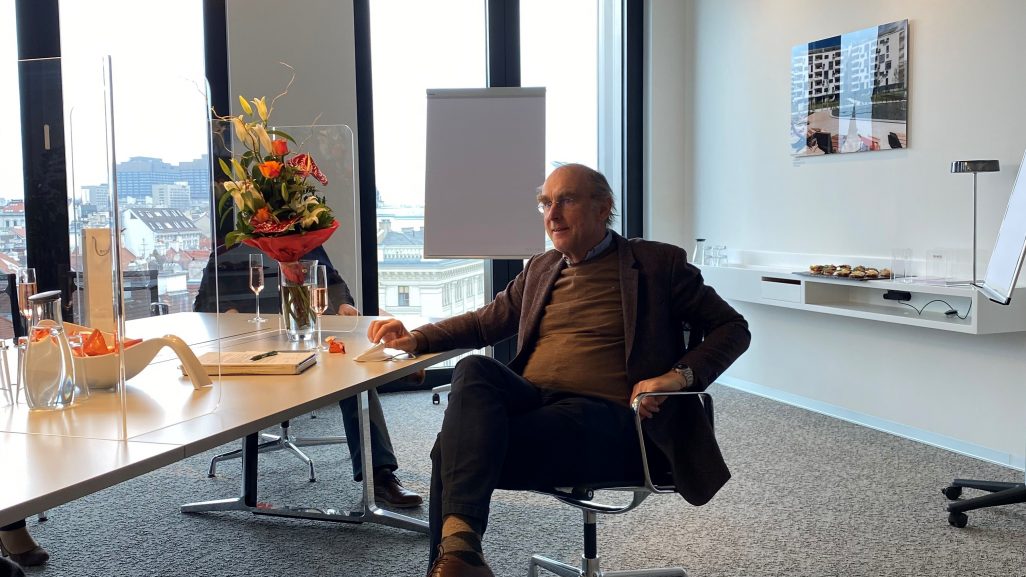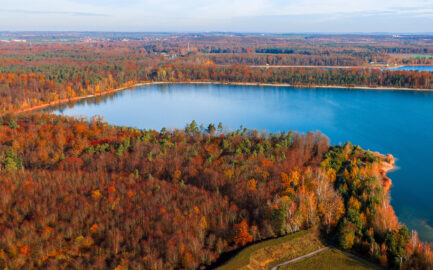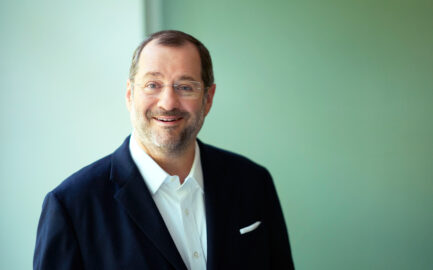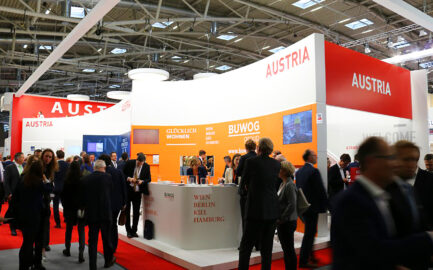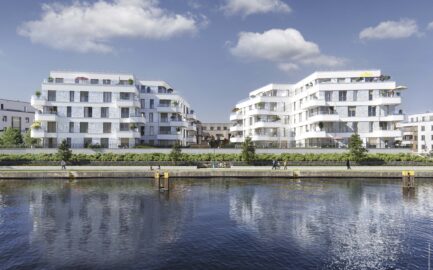“The road to success is an ongoing process, a path of learning with an accumulation of markers and signposts called experience.”
This time in our series “BUWOG, up close and personal” we talk to Karl Keusch. The long-time director of the construction management department is retiring this spring, though he assures that in the future he will also “play a role in the expanded BUWOG team to contribute to its continued success”. With a good dash of humour, Keusch talks about personal career highlights, transformation in the world of work, and what’s required for happy living. And we venture a glimpse into the future of the residential construction business.
Mr Keusch, you’ve been working at BUWOG now for over ten years. Can you still remember your first day on the job?
Well, I don’t remember my first day on the job at BUWOG on Thursday, 16 September 2010 in such detail, but my first impression was of a significant amount of movement and change. The entire department for new construction was undergoing reorganisation and the newly leased offices in the neighbouring building on Hietzinger Kai had just been moved into. There was a mutual sense of getting the feel for things, trying things out and getting to know one another – I think quite a common first-day feeling.
How did you come across BUWOG at the time?
As in numerous cases, through contacts and conversations among colleagues in the industry. I no longer remember from whom, but in a conversation on the side I found out that BUWOG was advertising for the head of structural engineering for new builds. As I didn’t feel entirely at home in my professional environment at the time, this sparked my interest and I actively applied. After a few phone calls and three personal interviews with Mr Schuster (note: Gerhard Schuster, managing director of BUWOG from 1996-2013), it was clear. Also, Mr Riedl (note: Daniel Riedl, member of the management board of Vonovia SE, the parent company of BUWOG) already knew me from project collaborations in the past – and he still didn’t object to me being hired (laughs)!
Had you always worked in the industry, or what did you do prior to your time at BUWOG?
Yes, I was always in the industry. In this respect, I’ve “only” travelled in one direction in my professional life, but it’s not a narrow country road, it’s a wide highway with multiple lanes. I’d already driven several lanes on that road. In the beginning, after my training and the army, I worked for more than ten years in a small architectural firm. The focus was on planning, technology and attention to detail. Then for another ten years or so I was in the real estate leasing company of an Austrian bank. There I was able to expand my horizon to include construction management and organisational aspects. The third stage was then in the real estate division of Constantia Privatbank, where I was able to gain substantial experience in the investment housing sector, but I was also able to work in the commercial sector for IMMOFINANZ. So on the one hand, I can see the years at BUWOG as an aggregation and fusion of the three prior stages and, on the other hand, as further development in line with the fairly marked and rapid changes in every area of our (working) world.
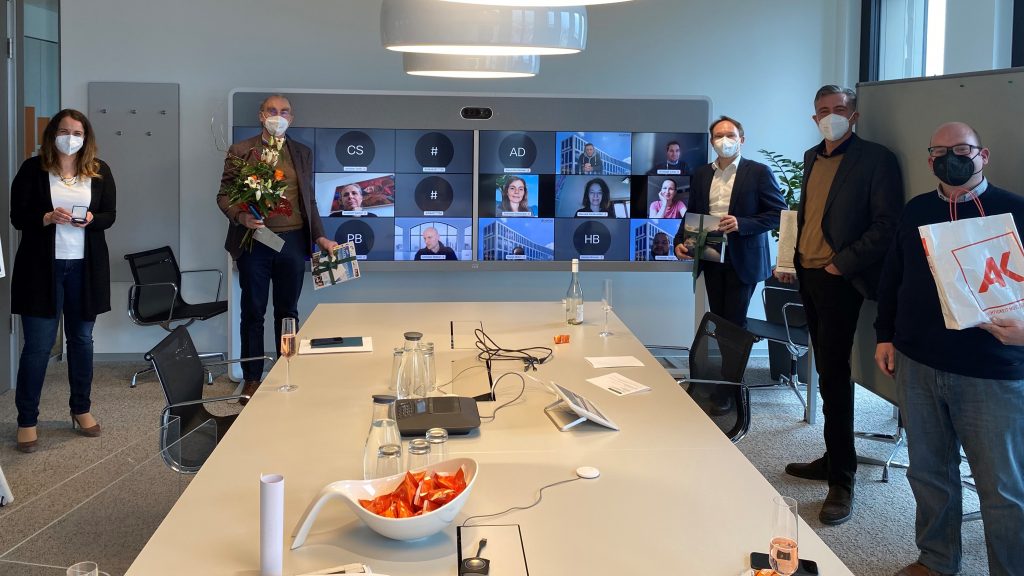
On the subject of that: How much has BUWOG changed for you in the last ten years?
Well, I didn’t yet experience the first major transfer from not-for-profit to commercial property developer as a BUWOG employee close up. But also after that, there always was – and still is – plenty of movement and dynamism in play. Whether it was external impetus such as the changes in the ownership structures, the expansion to Germany or recently as a result of Corona, or whether it was internal organisational changes such as the new positioning of our development department or new IT systems or the relocation of our location to the centre of Vienna: there have been changes everywhere that have contributed to BUWOG being where it is in 2021 – in the leading group of residential developers, as a company with a highly motivated and committed team with its finger on the pulse, agile, with its sights set on the future.
Not merely BUWOG, but also your areas of work in construction management must have changed substantially throughout your professional life…
Enormously! In the architectural firm, drawings were made with rapidographs and ink on tracing paper and plans were copied using ammonia tracers (for insiders: don’t forget the razor blade!); correspondence was exclusively by post – written with a typewriter, as were invitations to tender and specifications and offers; price lists were often handwritten large overview tables – calculated with large desktop calculators with paper roll printouts.
Excel, Word, Outlook, data warehousing, email, mobile phones, video conferencing – this wasn’t in our vocabulary at the end of the 70s, beginning of the 80s. From today’s perspective, it sounds almost unreal when you think of the tools and possibilities that information and communication technology offer us in our working environment in 2021 and which we’ve been implementing and applying, especially since “Corona”, to ensure our project and organisational processes. Nevertheless, despite all this “revolutionary” technological change in the professional world (and of course also in the private, personal sphere): behind it, or rather in front of it in terms of value, there is always a human being who is ultimately the truly decisive factor for success or failure, cooperation or confrontation, yes or no. This experience has been a constant for me throughout more than 40 years of professional life.
What were some formative experiences you’ll long remember?
I can’t name the one special highlight or the three or four outstanding experiences right at the moment. Not because there were no ups (or downs), but in this respect I’ve been employed in a truly privileged area: every project, every task in development somehow, somewhere and at some point – sometimes completely unexpectedly and surprisingly – holds a special challenge for everyone involved. Clearing these “hurdles” together or moving them aside were and are the formative experiences in the project team and therefore for me on the road to success: an ongoing process, a path of learning with an accumulation of markers and signposts called experience.
In addition, there are three “key events” for me: first, the reorganisation in Development under the new leadership of Mr Holler (note: Andreas Holler, managing director of BUWOG) and the restructuring of construction management in 2020 under the leadership of my successor Alexander Steppan; second, the involvement in our Rathausstraße 1 Customer and Administrative Centre project – for me “the BUWOG Gesamtkunstwerk“, because it shows what’s possible when, goal- and solution-oriented, all of the resources and competence in an organisation pull together! And third, coping with the exceptional challenge in the Corona pandemic. We were able to manage successfully, on schedule and with marvellous efficiency at the project level and as a whole with the cooperation of every colleague, management, the works council and at the executive level. Now that’s something to be proud of!
Looking ahead: Are there any plans and long-cherished projects you want to take time for in retirement?
In the Keusch house there is a basement that’s more akin to a junk room or “collection point for recyclables”. On the building plan, these rooms have odd names such as hobby room, workshop and sauna. Harmonising reality and the plan (which also applies to the garage, by the way) is a project for which the familiar “There’s always something to do!” applies.
There should also be more time now for (cultural) travel and hiking, and in the meantime there are also five grandchildren … so there’s no risk of boredom at the moment!
And besides that, you’re still available to BUWOG with your expertise. What else would you like to achieve in the near future? What projects are on the agenda?
First of all, I’m quite pleased that I can continue to play a part in, so to speak, the extended BUWOG team in order to contribute to the continued success story.
I will be happy to support my colleagues in ongoing projects with my experience and in-depth project-related knowledge and to advise and help with warranty issues. Future acquisition projects as well as questions relating to procurement and tendering strategies and quality assurance are also areas in which I will be pleased to assist, perhaps with the advantage that I’m no longer totally “on the front line” or directly involved in the day-to-day business, thus enabling a somewhat different perspective.
Where do you see BUWOG in ten years?
Well, I don’t have a finely polished crystal ball, and I’d rather enjoy my coffee than try to read the future in the brew. But seriously: I think the wheel of time turns so quickly and developments often happen so unexpectedly and suddenly that I don’t dare make a forecast here. What I’m certain of is that BUWOG will continue to succeed if it continues to look ahead, to take advantage of its rich experience, to promote, cultivate and bundle the competence and commitment of every employee, to operate in an open-minded, curious and innovative manner, and it remains a reliable and fair business partner. What I expect in any case is that in the future, the “residential” offer will not be limited to the development of housing and immediate common and open areas. I’m thinking of services in the broadest sense, such as relocation and settlement services. Also, the home office so relevant now will transform our housing product in the direction of living and working as well as flexibility in relation to changing needs in different stages of life, and last but not least, at the top of the list: sustainability, ecology and energy efficiency. If BUWOG continues to act with foresight as it has in the past – and doesn’t just react when others are already in the running – it will also retain a fixed place in the leading group for the overall “housing plus” package in ten years.
Speaking of housing: What is your personal understanding of happy living?
For me, it is simply the combination of “living” reduced to the objective and real, a safe roof over one’s head, enough space for everyone in the household, heating in winter, hygiene, etc., and the subjective-emotional “happy”, i.e. questions of comfort and demands, design, location and surroundings, personal well-being and health.
“Bad” housing will make your performance and health suffer. Those who find a balanced and coherent personal environment have a starting point for “happy living”. This reciprocal effect, which blurs the boundaries between “living” and “life”, illustrates the importance of the basic need of housing.

